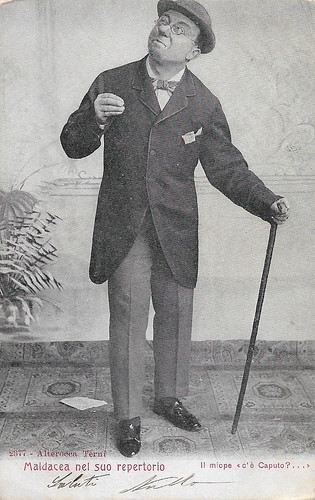
Italian postcard by Alterocca, Terni, no. 2377. Caption: Maldacea nel suo repertorio. Il miope "c'è Caputo?..." (The nearsighted: "Do you understand?").
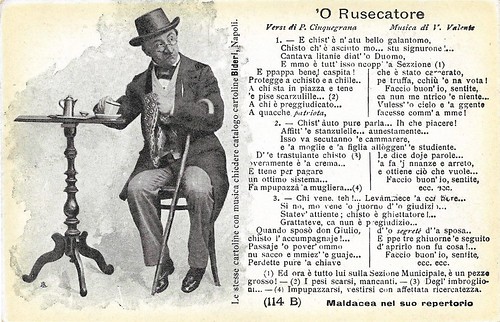
Italian postcard by Ed. Bideri, Napoli, no. 114 B. Caption: Maldacea nel suo repertorio. 'O Rusecatore (the slanderer, who pretends he is only minding his own business). This was one of Maldicea's popular songs. Hear it on YouTube.
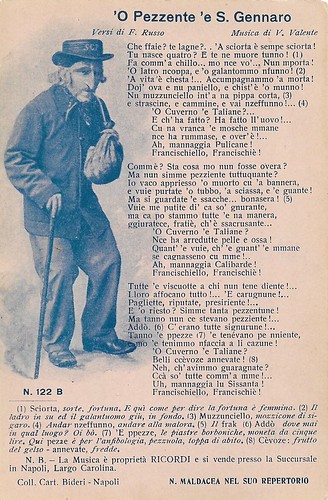
Italian postcard by Ed. Bideri, Napoli, no. 122 B. Caption: Maldacea nel suo repertorio. 'O Pezzente 'e S. Gennaro (the bum of San Gennaro).
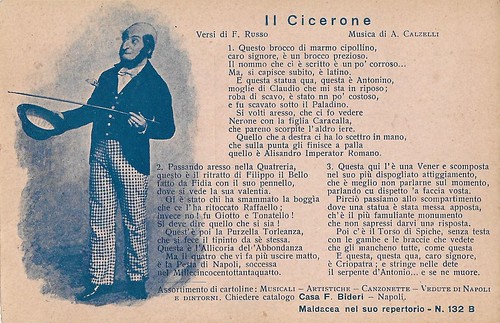
Italian postcard by Ed. Bideri, Napoli, no. 132 B. Caption: Maldacea nel suo repertorio. Il Cicerone (the tourist guide).
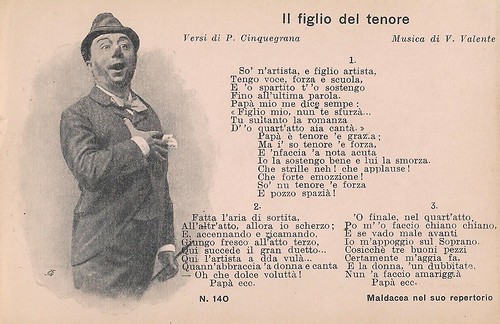
Italian postcard by Ed. Bideri, Napoli, no. 140. Caption: Maldacea nel suo repertorio. Il figlio del tenore (The tenor's son).
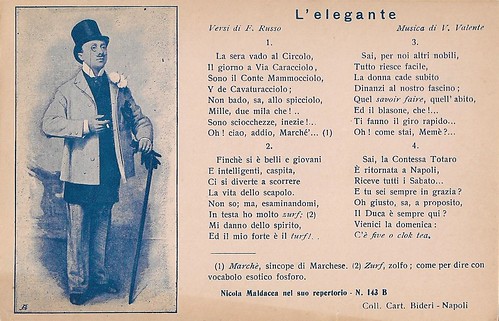
Italian postcard by Ed. Bideri, Napoli, no. 143 B. Caption: Maldacea nel suo repertorio. L'elegante (the stylish one).
Variety and Café-chantant
Nicola Maldacea was born in Naples, Italy, in 1870.
The son of an elementary school teacher originally from Cosenza, he embarked on a theatrical career in his hometown, debuting at a very young age on the boards of variety and café-chantant stages.
Gifted with a robust voice, he made his debut as a singer performing in the clubs of Naples, until he was written for the theatre companies of Eduardo Scarpetta and Gennaro Pantalena, with whom he was able to make a name for himself and land at the Salone Margherita, the most distinguished café-chantant of Naples.
The acting style adopted during the performance of the pieces caused Maldacea to provide a satirical interpretation suited to the caricature of the characters treated: thus were born the 'macchiette', which Maldacea himself described thus: "Like a draughtsman, I promised myself to give the audience an immediate impression by sketching the type, marking it quickly, rendering its salient features. Hence the origin of the word "macchietta", which is peculiar to figurative art: a hasty sketch, rendering with a few brushstrokes a place or a person in such a way as to give an effective impression with the utmost spontaneity of caricature."
In the period leading up to World War I, he raged in Neapolitan theatres, becoming one of the city's most famous actors. Among the most famous types he played were "Il Conte Flick", "'O jettatore", "il Superuomo", "'O Rusecatore", and "l'Elegante". Set to music by Vincenzo Valente and Salvatore Gambardella, the macchiette had among their authors such names as Salvatore Di Giacomo, Trilussa, Rocco Galdieri and others, who wrote, often without signing, specifically for Maldacea.
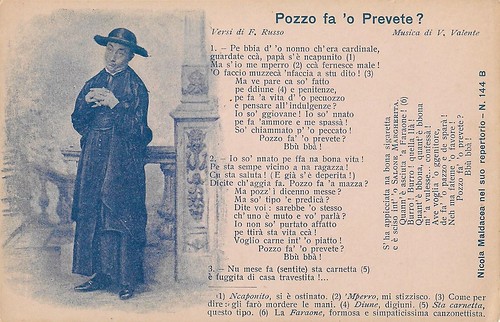
Italian postcard by Ed. Bideri, Napoli, no. 144 B. Caption: Maldacea nel suo repertorio. Pozzo fa 'o Prevete (Pozzo pretends to be a priest).

Italian postcard by Ed. Bideri, Napoli, no. 146 B. Caption: Maldacea nel suo repertorio. Don Frichino (Mr. Richie).
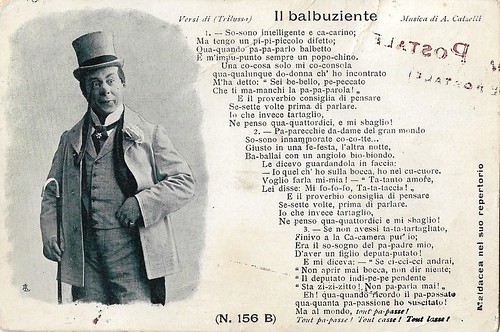
Italian postcard by Ed. Bideri, Napoli, no. 156 B. Caption: Maldacea nel suo repertorio. Il balbuziente (the stutterer). Hear Maldacea sing this song on YouTube.
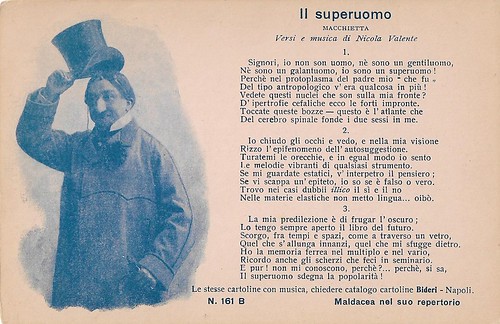
Italian postcard by Ed. Bideri, Napoli, no. 161 B. Caption: Maldacea nel suo repertorio. Il superuomo (the superman). Hear Maldacea sing this song on YouTube.
Character parts in the cinema
From 1935, Nicola Maldacea also acted in cinema, almost always in character parts, and in over 60 films. A typical early film was his film debut, the musical Napoli verde-blu/Naples in Green and Blue (Armando Fizzarotti, 1935). It was a low-budget revue starring such popular performers as Lina Gennari, Ellen Meis and Silvio Orsini, set in Naples, but shot in a studio in Rome.
Memorable parts he had in È tornato carnevale/Carnival Is Here Again (Raffaele Matarazzo, 1937) with Armando Falconi, the romantic comedy Ho perduto il mio marito/I've Lost My Husband! (Enrico Guazzoni, 1937) with Paola Borboni, the comedy Il feroce Saladino/The Ferocious Saladin (Mario Bonnard, 1937) with Sicilian comedian Angelo Musco and Alida Valli, I due misantropi/The Two Misanthropists (Amleto Palermi, 1937), and Le père Lebonnard/Father Lebonnard (Jean de Limur, 1939).
During the war years, Maldacea could be seen in supporting parts in Kean (Guido Brignone, 1940) starring Rossano Brazzi, Miseria e nobiltà/Poverty and nobility (Corrado D'Errico, 1940) with Napolitan comedian Scarpetta, and Villa da vendere/Villa for sale(Ferruccio Cerio, 1941) with Amedeo Nazzari. In these films he often played domestics.
There were exceptions. He was the servile court painter in Tosca (Jean Renoir, Carl Koch, 1940-41), a non-musical account of Puccini's opera starring Imperio Argentina and Michel Simon. He played the priest in Nessuna torna indietro/Responsibility Comes Back (Alessandro Blasetti, 1943-1945) about the aspirations and future hopes of seven young women in a boarding house in Rome during WWII.
Nicola Maldacea died in Rome on 5 March 1945. The city of Naples carried out the translation of his remains from Rome to Poggioreale Cemetery. He had written his biography in 'Memorie di Maldacea' (1933).
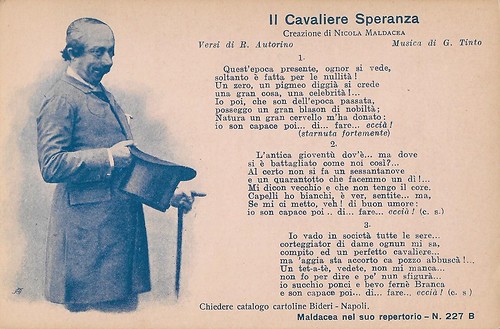
Italian postcard by Ed. Bideri, Napoli, no. 277 B. Caption: Maldacea nel suo repertorio. Il Cavaliere Speranza [the hopeful knight].
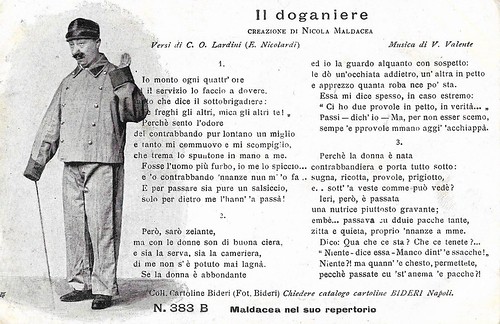
Italian postcard by Ed. Bideri, Napoli, no. 383 B. Caption: Maldacea nel suo repertorio. Il doganiere (the customs officer).
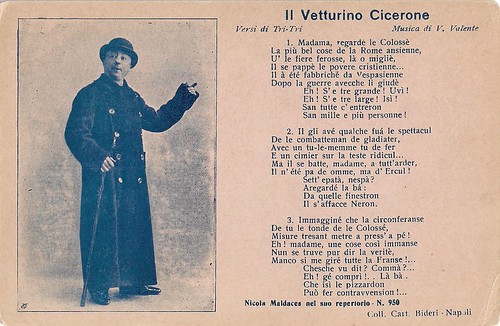
Italian postcard by Ed. Bideri, Napoli, no. 950. Caption: Maldacea nel suo repertorio. Il Vetturino Cicerone (the coachman tourist guide).
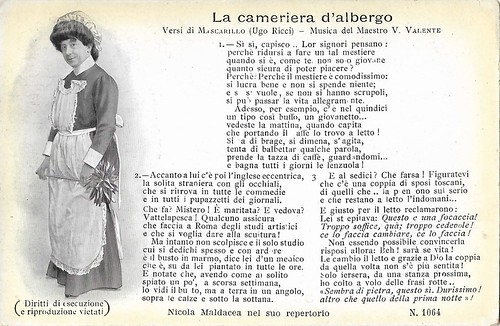
Italian postcard by Ed. Bideri, Napoli, no. 1064. Caption: Maldacea nel suo repertorio. La cameriera d'albergo (the hotel servant).
Sources: Sapere (Italian), Wikipedia (Italian and English), and IMDb.
No comments:
Post a Comment